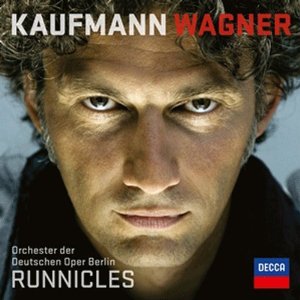|
|
|
|
|
|
|
|
|
San Francisco Classical Voice, February 15, 2013 |
| By Jason Victor Serinus |
|
|
|
Kaufmann's Wagner: Promise Amply Fulfilled |
|
|
 At
last, with performances of Wagner’s Ring Cycle, Lohengrin, and Parsifal
under his belt, tenor Jonas Kaufmann delivers his first all-Wagner CD
recital. Recorded September 17–22, 2012, with the Orchester der Deutschen
Oper Berlin, conducted by Donald Runnicles (former music director of the San
Francisco Opera), Kaufmann offers further confirmation that he is indeed the
longed-for Wagnerian hero of our generation. At
last, with performances of Wagner’s Ring Cycle, Lohengrin, and Parsifal
under his belt, tenor Jonas Kaufmann delivers his first all-Wagner CD
recital. Recorded September 17–22, 2012, with the Orchester der Deutschen
Oper Berlin, conducted by Donald Runnicles (former music director of the San
Francisco Opera), Kaufmann offers further confirmation that he is indeed the
longed-for Wagnerian hero of our generation.
Our hero may sing
Romantic music from an era in which women were suffering maids and men their
rescuers in shining armor, but he is not so attached to masculine trappings
that he will not risk venturing into soprano/high mezzo territory when he
hears the call. Hence, Kaufmann follows heroic excerpts from Die Walküre,
Siegfried, Rienzi, Tannhäuser, Die Meistersinger von Nürnberg, and Lohengrin
with the five Wesendonck-Lieder. Settings of texts by Mathilde Wesendonck,
some of which served as studies for Tristan und Isolde, the songs have long
been associated with the great Wagnerian sopranos of the 20th century. In
fact, according to arkivmusic.com, the only Wagnerian tenor of merit who
dared record them before now is René Kollo.
Kaufmann has nothing to
worry about. In the face of naysayers who proclaim that singing too many
heroic tenor roles will thicken if not wreck his gorgeous voice, he both
lightens and sweetens to sing beautiful, deeply felt versions of the
Wesendonck Songs. His performances of the two songs that call for the most
“feminine” touch, “Der Engel” (The angel) and “Träume” (Dreams), are perhaps
the most remarkable for their sensitivity. While Kaufmann’s rendition will
never replace Eileen Farrell’s second recording of these songs (with
Bernstein) or Lotte Lehmann’s incomparable early electrical performance of
“Träume,” in part because the beat is less flexible, the singing is so
gorgeous that it’s reason enough to buy the disc.
But who needs just
one reason when every performance is a gem? Taking on the great heldentenor
Lauritz Melchior, who in Die Walküre was known to hold Siegmund’s
high-pitched cry, “Wälse! Wälse!” for impossible lengths, Kaufmann sings a
Sword Monologue for the ages. If, in the end, recordings by the deceased
heldentenor may inspire greater awe, recall that Melchior’s stage presence
was virtually nonexistent, while Kaufmann’s is as believable as it gets.
Several residents of Bayreuth whom I spoke with last summer told me how
much they preferred Klaus Florian Vogt’s sweet-voiced Lohengrin to
Kaufmann’s. Yet, listening to Kaufmann’s Grail Narration, it’s hard to
imagine a more convincingly mystical, otherworldly start to “In fernem Land”
(In a far-off land). With Runnicles’ transparent support, Kaufmann sounds as
if transported to a land of the holy and the wise. His performance — which
comes complete with the original, less tuneful second verse that, in
Kaufmann’s words, “explains an important part of the action” — is
extraordinary.
Then again, so are Kaufmann’s fervent Siegfried, who
truly sounds naive; his sincere and prayerful Rienzi; and his angry,
pain-filled Tannhäuser. The voice is as handsome as Kaufmann’s countenance,
and equally seductive. The better the sound system, the more delicious he
sounds. Do you need more adjectives to convince you to get this disc?
Jason Victor Serinus is a professional whistler and lecturer on opera
and vocal recordings who writes about music for Opera News, Opera Now,
American Record Guide, Stereophile, San Francisco Magazine, Gramophone,
Carnegie Hall Playbill, East Bay Express, Stanford Lively Arts, San
Francisco Examiner, Bay Area Reporter, hometheaterhifi.com, and other
publications.
|
|
|
|
|
|
|
|
|
|
|
|
|
|
|
|
|
|
|